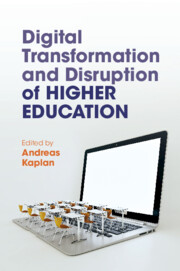Book contents
- Digital Transformation and Disruption of Higher Education
- Digital Transformation and Disruption of Higher Education
- Copyright page
- Contents
- Figures
- Tables
- Contributors
- Preface
- Chapter 1 Nothing Is Constant Except Change
- Part I (R)evolution of the Higher Education Sector
- Part II Changes in Teaching Formats
- Part III Changes in Teaching Content
- Part IV Networking and Social Activities
- Part V Certification and Diplomas
- Part VI Careers and Professionalisation
- Part VII Futuristic and Ultramodern Higher Education
- Part VIII Higher Education in Motion
- Editor’s Biography
- Index
- References
Part III - Changes in Teaching Content
Published online by Cambridge University Press: 09 June 2022
- Digital Transformation and Disruption of Higher Education
- Digital Transformation and Disruption of Higher Education
- Copyright page
- Contents
- Figures
- Tables
- Contributors
- Preface
- Chapter 1 Nothing Is Constant Except Change
- Part I (R)evolution of the Higher Education Sector
- Part II Changes in Teaching Formats
- Part III Changes in Teaching Content
- Part IV Networking and Social Activities
- Part V Certification and Diplomas
- Part VI Careers and Professionalisation
- Part VII Futuristic and Ultramodern Higher Education
- Part VIII Higher Education in Motion
- Editor’s Biography
- Index
- References
Summary

- Type
- Chapter
- Information
- Digital Transformation and Disruption of Higher Education , pp. 145 - 192Publisher: Cambridge University PressPrint publication year: 2022



